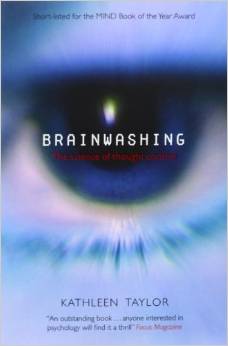
Kathleen Taylor/5
2 notes
Résumé :
Throughout history, humans have attempted to influence and control the thoughts of others. Since the word 'brainwashing' was coined in the aftermath of the Korean War, it has become part of the popular culture, served as a topic for jokes, and been exploited to create sensational headlines. It has also been the subject of learned discussion from many disciplines: including history, sociology, psychology, and psychotherapy. But until now, a crucial part of the debate... >Voir plus
étiquettes
Ajouter des étiquettes
Que lire après Brainwashing: The science of thought controlVoir plus
Citations et extraits (5)
Ajouter une citation
One obvious change to our environments which (unlike sensory deprivation experiments) has the power to affect a large number of people simultaneously is the growth of mass media such as televison and the Internet. These technologies are applications of physics that have had a huge impact on modern life. In her book 'Tomorrow's People' brain scientist Susan Greenfield speculates that the further development of mass media technologies into the realm of sophisticated virtual reality could create increasingly infantilized, stimulus-driven, and asocial consumers whose every need is anticipated and provided by endlessly watchful information technologies. Change the world, Greenfield argues, and you change the selves that live in it. The change we in the rich West are contemplating could fondamentally alter human nature.
There is in fact considerable evidence that mass media models of the world we live in have a significant impact on us. These portrayals of 'real life' (...) can shape our behaviour in ways we may not recognize. Studies in Britain and the United States, for exemple, consistently show a fear of crime which is out of proportion to the actual risks of being a victim, but which reflects the proportion of attention devoted by the media to crime. Television shows provide extremely distorted versions of reality. (...) in the world of television beautiful people are much more common than in real life, as are doctors and lawyers, while positive role models of scientists, the elderly, the disabled, or ethnic minorities are much less common. We all think we know it's not real, yet US studies have clearly shown that people who watch more television have a more distorted, racist world view than those who watch less. Television can affect behaviour as well as attitudes.
Perhaps the medicine of the future will include brain-tidying kits which allow a patient to remove unwanted cogwebs. First: the schizophrenic's delusions; the depressive's self-excoriating thoughts; the agonizing flashbacks of post-traumatic stress disorder. Later: unruly children; social stresses; the phobic's linking of fear to innocuous target. Later still: the song heard and hated which won't stop buzzing round one's temporal lobes; the ex-wife's nastier comments; the memory of a put-down from the boss.
In other words, the critics fear that advertising and the media may be contributing to our immersion in an environment which is in fact becoming increasingly manipulative. Someone (or several someones) - the media, the government, or pick your pet bugbear - is setting our agendas for us, dictating not what we think but what we think about.
Crudely, State-owned media will tend to reflect the attitudes of the State and its desire for control, while privatized media reflect the attitudes of their owners and their desire for profit.
autres livres classés : lavage de cerveauVoir plus
Les Dernières Actualités
Voir plus
Quiz
Voir plus
Freud et les autres...
Combien y a-t-il de leçons sur la psychanalyse selon Freud ?
3
4
5
6
10 questions
434 lecteurs ont répondu
Thèmes :
psychologie
, psychanalyse
, sciences humainesCréer un quiz sur ce livre434 lecteurs ont répondu


























